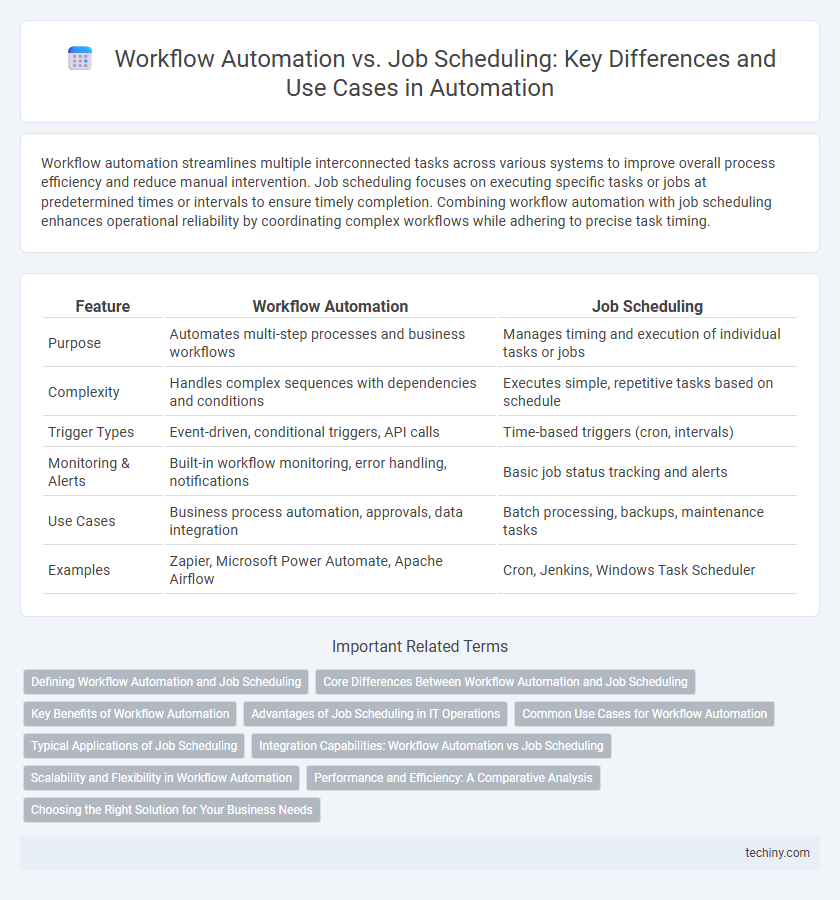Workflow automation streamlines multiple interconnected tasks across various systems to improve overall process efficiency and reduce manual intervention. Job scheduling focuses on executing specific tasks or jobs at predetermined times or intervals to ensure timely completion. Combining workflow automation with job scheduling enhances operational reliability by coordinating complex workflows while adhering to precise task timing.
Table of Comparison
| Feature | Workflow Automation | Job Scheduling |
|---|---|---|
| Purpose | Automates multi-step processes and business workflows | Manages timing and execution of individual tasks or jobs |
| Complexity | Handles complex sequences with dependencies and conditions | Executes simple, repetitive tasks based on schedule |
| Trigger Types | Event-driven, conditional triggers, API calls | Time-based triggers (cron, intervals) |
| Monitoring & Alerts | Built-in workflow monitoring, error handling, notifications | Basic job status tracking and alerts |
| Use Cases | Business process automation, approvals, data integration | Batch processing, backups, maintenance tasks |
| Examples | Zapier, Microsoft Power Automate, Apache Airflow | Cron, Jenkins, Windows Task Scheduler |
Defining Workflow Automation and Job Scheduling
Workflow automation streamlines complex business processes by integrating multiple tasks and decision points into a cohesive sequence, enhancing efficiency and reducing manual intervention. Job scheduling involves the automated initiation of individual tasks or jobs at predefined times or intervals without considering interdependent steps. Workflow automation emphasizes process orchestration across various systems, whereas job scheduling focuses on timing and execution of discrete tasks.
Core Differences Between Workflow Automation and Job Scheduling
Workflow automation orchestrates a series of interconnected tasks to complete complex business processes, emphasizing dependency management, conditional logic, and real-time monitoring. Job scheduling focuses on executing predefined tasks or scripts at specific times or intervals without necessarily handling dependencies between tasks. The core difference lies in workflow automation's ability to manage dynamic, multi-step processes versus job scheduling's role in time-based task execution.
Key Benefits of Workflow Automation
Workflow automation streamlines complex processes by integrating multiple tasks and systems into a cohesive sequence, enhancing overall operational efficiency and reducing human error. It enables real-time monitoring, adaptive decision-making, and seamless collaboration across departments, unlike traditional job scheduling which primarily focuses on executing predefined, individual tasks. Key benefits include improved accuracy, faster processing times, and scalability to accommodate dynamic business requirements.
Advantages of Job Scheduling in IT Operations
Job scheduling in IT operations ensures precise task execution by automating the timing and sequence of processes, reducing human error and increasing efficiency. It optimizes resource allocation by running jobs during off-peak hours, minimizing system downtime and improving overall performance. Enhanced monitoring and reporting capabilities enable IT teams to quickly identify and resolve issues, ensuring smoother workflow management compared to traditional automation methods.
Common Use Cases for Workflow Automation
Workflow automation streamlines complex business processes by integrating multiple tasks across departments, enabling seamless data flow and real-time monitoring. Common use cases include automated invoice processing, customer onboarding, and employee onboarding, where predefined triggers initiate coordinated actions without manual intervention. This approach enhances efficiency, reduces errors, and accelerates compliance by managing interdependent activities in a unified system.
Typical Applications of Job Scheduling
Typical applications of job scheduling include automating batch processing tasks like data backups, system maintenance, and report generation, ensuring these tasks run at predefined times without manual intervention. It optimizes resource allocation by managing task dependencies and execution sequences, improving system reliability and efficiency. Industries such as IT, finance, and manufacturing heavily rely on job scheduling to maintain consistent operations and reduce downtime.
Integration Capabilities: Workflow Automation vs Job Scheduling
Workflow automation platforms offer extensive integration capabilities by connecting diverse applications, APIs, and data sources to create seamless end-to-end processes, enabling dynamic decision-making and real-time updates. Job scheduling tools primarily focus on running predefined tasks at specific times or intervals, with limited integration options and minimal interaction between jobs. The advanced integration in workflow automation supports complex, multi-step operations, while job scheduling excels in straightforward, time-based task execution.
Scalability and Flexibility in Workflow Automation
Workflow automation offers superior scalability by enabling dynamic adjustment of processes to accommodate growing volumes and complexity without manual intervention. Its flexibility allows seamless integration of diverse applications and real-time adaptation to changing business rules, unlike traditional job scheduling which relies on static, pre-defined tasks. This adaptability ensures workflow automation can efficiently handle evolving operational demands and support continuous improvement initiatives.
Performance and Efficiency: A Comparative Analysis
Workflow automation streamlines complex processes by integrating multiple tasks and decision points, significantly enhancing overall performance through reduced manual intervention and error rates. Job scheduling focuses on optimizing resource allocation by executing predefined tasks at specific times, improving system efficiency in handling repetitive operations. Comparing the two, workflow automation offers greater flexibility and end-to-end process optimization, while job scheduling excels in maximizing performance for time-sensitive, routine task execution.
Choosing the Right Solution for Your Business Needs
Workflow automation streamlines complex business processes by integrating multiple tasks across systems, while job scheduling focuses on executing specific tasks at predetermined times. Choosing between workflow automation and job scheduling depends on your business requirements: opt for workflow automation to enhance end-to-end process efficiency and job scheduling for reliable, time-based task execution. Evaluating factors like task complexity, frequency, and integration needs ensures the selection of the most effective automation solution.
Workflow Automation vs Job Scheduling Infographic

 techiny.com
techiny.com